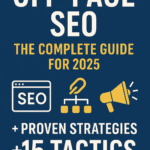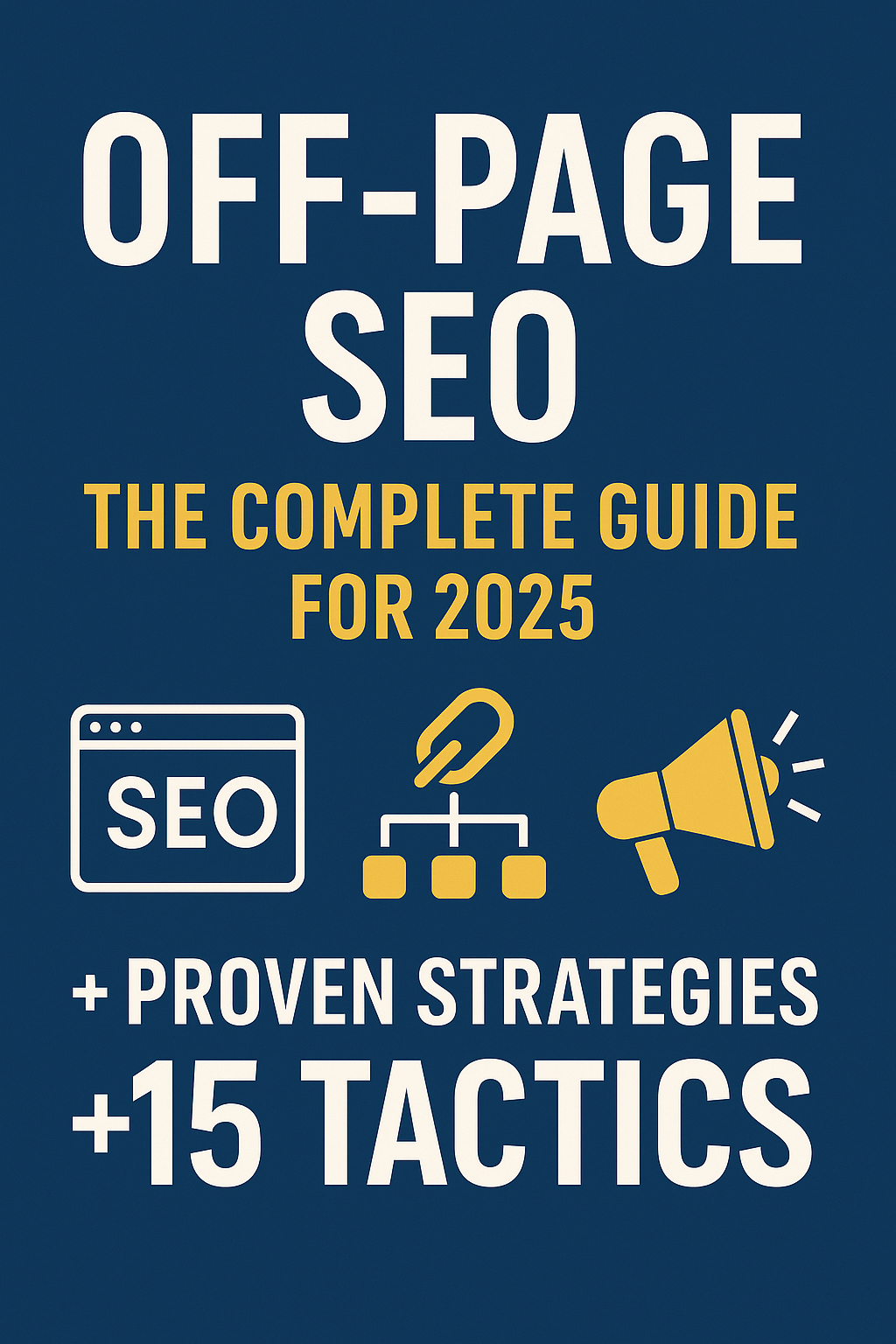What is Off-Page SEO?
Off-page SEO refers to all the activities and techniques you use outside your website to improve its position in search engine rankings. While on-page SEO focuses on optimizing your website content, structure, and internal links, off-page SEO is all about increasing your site’s authority, relevance, and trust in the eyes of Google and other search engines.
In 2025, with constant algorithm changes, off-page SEO is more critical than ever. It determines how search engines perceive your website in the broader context of the web.
Why is Off-Page SEO Important in 2025?
Off-page SEO is the backbone of your site’s reputation. No matter how well-optimized your site is internally, without off-page SEO efforts, you’ll struggle to compete in a saturated online market.
Here’s why it matters:
- Boosts Domain Authority (DA): The higher your DA, the more likely you’ll rank.
- Enhances Trust & Credibility: Backlinks from authoritative sites signal trust to Google.
- Drives Referral Traffic: High-quality backlinks can bring consistent, targeted visitors.
- Improves Search Rankings: Strong off-page signals influence your SERP position directly.
Key Differences Between On-Page and Off-Page SEO
| Factor | On-Page SEO | Off-Page SEO |
|---|---|---|
| Location of Effort | On your own website | Outside your website |
| Main Focus | Content, keywords, meta tags, internal linking | Backlinks, authority, trust, engagement |
| Direct Control | Full control | Limited control |
| Tools Used | Yoast, Rank Math, Screaming Frog | Ahrefs, SEMrush, BuzzSumo |
Top 15 Off-Page SEO Techniques
Let’s break down the best off-page SEO techniques to use in 2025:
1. Link Building Through High-Authority Sites
Backlinks remain the #1 ranking factor. You want to earn links from reputable, high-authority domains in your niche. Focus on quality over quantity.
🔹 Tip: Use Ahrefs or Moz to analyze a site’s Domain Rating (DR) or Domain Authority (DA) before building links.
2. Guest Blogging for Traffic and Backlinks
Guest blogging is still one of the most effective ways to build links and authority.
- Choose blogs in your niche with good traffic and DA.
- Provide original, valuable content.
- Include a contextual backlink to your site.
3. Social Media Engagement & Signals
Though social signals aren’t direct ranking factors, they amplify your content reach, leading to natural backlink generation.
- Share consistently across LinkedIn, Twitter, Facebook.
- Engage with your audience through polls, comments, and lives.
4. Influencer Outreach
Partnering with influencers helps amplify your message and boost brand visibility.
- Micro-influencers are affordable and highly targeted.
- Use tools like BuzzSumo or NinjaOutreach for influencer discovery.
5. Brand Mentions (Unlinked and Linked)
Google’s algorithm recognizes brand mentions as trust signals, even when they’re unlinked.
- Monitor your mentions using Google Alerts or BrandMentions.
- Politely request a backlink if someone mentions your brand.
6. Broken Link Building
Find broken links on authoritative websites and suggest your working content as a replacement.
- Tools: Ahrefs, SEMrush, or Check My Links Chrome Extension.
- Benefit: Helps site owners and builds you a quality backlink.
7. Local SEO & Citations
For local businesses, off-page SEO means NAP (Name, Address, Phone) consistency across directories like:
- Google Business Profile
- Yelp
- Bing Places
- Yellow Pages
Local backlinks + reviews = Local dominance.
8. Podcast Guesting
Appearing as a guest on podcasts exposes you to new audiences and often comes with contextual backlinks in show notes.
9. Directory Submissions
Submit your site to high-quality, niche-relevant directories.
Avoid spammy directories. Look for editorial oversight and domain authority.
10. Forum Participation
Engage in discussions on platforms like:
- Warrior Forum
- Digital Point
Don’t spam! Contribute value and link only when relevant.
11. Answering on Quora & Reddit
These platforms allow you to build authority in your niche. Answer relevant questions thoroughly, and drop a contextual link where allowed.
12. Press Releases & Digital PR
Issue press releases for product launches, events, or achievements.
- Use PRWeb or BusinessWire.
- Gain backlinks from news sites & blogs.
13. Content Syndication
Republish your blog posts on platforms like:
- Medium
- LinkedIn Articles
- GrowthHackers
Include canonical tags to avoid duplicate content penalties.
14. Document Sharing
Upload whitepapers, presentations, and ebooks to:
- SlideShare
- Scribd
- Issuu
Optimize file names and descriptions with keywords.
Measuring Off-Page SEO Success
Track these KPIs to measure your off-page SEO performance:
| Metric | Tool Used |
|---|---|
| Number of Referring Domains | Ahrefs, SEMrush |
| Domain Authority / Rating | Moz, Ahrefs |
| Organic Traffic Growth | Google Analytics |
| Brand Mentions | BrandMentions, Google Alerts |
| Backlink Quality | Ahrefs, Moz |
Common Off-Page SEO Mistakes to Avoid
- Buying low-quality backlinks (can lead to Google penalties)
- Over-optimizing anchor text
- Ignoring brand reputation or negative reviews
- Submitting to spammy directories
- Forgetting about mobile-first indexing and local SEO
Future Trends in Off-Page SEO for 2025
- AI-Driven Link Building Tools: Expect smart automation with human-quality outreach.
- Voice Search Optimization: Off-page efforts will need to consider how users ask questions.
- Video SEO: YouTube backlinks and brand presence will matter more.
- Brand Authority Signals: Google increasingly ranks entities, not just websites.
FAQs About Off-Page SEO
1. How long does off-page SEO take to show results?
Typically, you’ll start seeing results in 3–6 months, depending on competition and consistency.
2. Can I do off-page SEO without a website?
Technically yes—through social media and directory listings—but you’ll be limited without a central website.
3. Is off-page SEO better than on-page SEO?
Neither is better. They complement each other. You need both for maximum visibility.
4. Are nofollow backlinks valuable?
Yes! While they don’t pass link juice, they build trust and drive traffic.
5. How do I find good websites for link building?
Use tools like Ahrefs, BuzzSumo, or look for competitor backlinks and outreach similar sources.
6. What’s the best free tool for monitoring backlinks?
Ubersuggest offers a decent free version for checking backlinks and domain scores.
Conclusion: Build Authority Beyond the Website
Off-page SEO is all about building your brand’s authority and trust in places other than your site. It’s no longer just about links—it’s about visibility, engagement, and reputation. In 2025, a successful SEO strategy requires balanced efforts between on-page and off-page optimization.
So whether you’re a freelancer, business owner, or SEO agency, start focusing on these 15 tactics and watch your rankings skyrocket.

